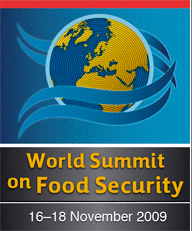Linked events
The outcomes of three related events taking place just ahead of the Summit contributed to the debate—a private-sector forum (Milan, 12–13 November), an inter-parliamentary meeting (Rome, 13 November) and a civil society forum (Rome, 14–16 November).
FAO says three events in October 2009 prepared the ground for the Summit. These were: a High-level Expert Forum on How to Feed to World in 2050, from 12–13 October; the Committee on World Food Security, from 14 to 17 October; and World Food Day on 16 October.
The launch of the 1 billion hungry campaign a week prior to the event.
FAO Director-General Jacques Diouf told a pre-Summit Private Sector Forum on 12 November that the importance of the private sector has increased due to privatization, globalization and the transformation of the food chain. [6]
On the eve of the summit, FAO Director-General began a 24-hour hunger strike to call for action to end the scourge of hunger and in solidarity with the one billion humans who suffer chronic malnutrition. [7] He called on "people of goodwill everywhere" to join him in a worldwide hunger strike this weekend. [8]
FAO on Monday 16 November 2009, said that agreeing a climate change deal in Copenhagen at the COP15 ( 7–18 December 2009) is crucial to fighting global hunger, which Brazil's president described as "the most devastating weapon of mass destruction." [9]
This page is based on this
Wikipedia article Text is available under the
CC BY-SA 4.0 license; additional terms may apply.
Images, videos and audio are available under their respective licenses.
